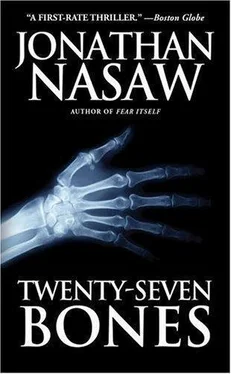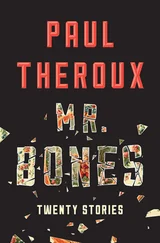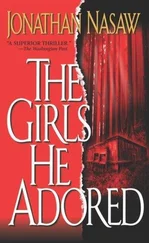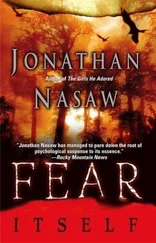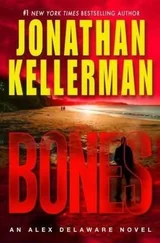Jonathan Nasaw - Twenty-Seven Bones
Здесь есть возможность читать онлайн «Jonathan Nasaw - Twenty-Seven Bones» весь текст электронной книги совершенно бесплатно (целиком полную версию без сокращений). В некоторых случаях можно слушать аудио, скачать через торрент в формате fb2 и присутствует краткое содержание. Жанр: Триллер, на английском языке. Описание произведения, (предисловие) а так же отзывы посетителей доступны на портале библиотеки ЛибКат.
- Название:Twenty-Seven Bones
- Автор:
- Жанр:
- Год:неизвестен
- ISBN:нет данных
- Рейтинг книги:4 / 5. Голосов: 1
-
Избранное:Добавить в избранное
- Отзывы:
-
Ваша оценка:
- 80
- 1
- 2
- 3
- 4
- 5
Twenty-Seven Bones: краткое содержание, описание и аннотация
Предлагаем к чтению аннотацию, описание, краткое содержание или предисловие (зависит от того, что написал сам автор книги «Twenty-Seven Bones»). Если вы не нашли необходимую информацию о книге — напишите в комментариях, мы постараемся отыскать её.
Twenty-Seven Bones — читать онлайн бесплатно полную книгу (весь текст) целиком
Ниже представлен текст книги, разбитый по страницам. Система сохранения места последней прочитанной страницы, позволяет с удобством читать онлайн бесплатно книгу «Twenty-Seven Bones», без необходимости каждый раз заново искать на чём Вы остановились. Поставьте закладку, и сможете в любой момент перейти на страницу, на которой закончили чтение.
Интервал:
Закладка:
Over dinner, they exchanged life stories. He gave her his, she gave him C. B. Dawson’s-by then she knew it as well as she knew her own. But just the skeleton, no embellishments, and when he pressed her, she deflected his questions with questions of her own. She had a million of ’em. What was happening in the investigation? Were the police any closer to finding the killer? How many victims had he claimed thus far?
For a change, Pender was free to answer at least some of her questions. Tomorrow’s Sentinel, he knew, would be breaking most of the story, linking the death of Fran Bendt to that of Hokey Apgard.
It was only a matter of time before the story broke anyway, Perry Faartoft had told Julian, who’d informed Pender. Newspapers can sweep a lot of things under the rug, but the death of a reporter isn’t one of them. The afternoon hydrofoil had brought reporters from Puerto Rico and St. Thomas-poor Fran had scooped himself with his own death.
After some heated bargaining, including a conference call with the governor and the head of the St. Luke Chamber of Commerce, the publisher had agreed to hold back news of the bodies that had washed up on the rocks beneath the Carib cliffs and not to bring up Hettie Jenkuns again. With only two deaths, there’d be at least a chance the stateside papers wouldn’t be picking up the story.
That chance soon diminished considerably, however. As dessert was being served (flan drizzled with pomegranate syrup), the maitre d’ stealthily signaled to Pender that he had a phone call.
He took it in the bar. It was Julian. “How’d you find me?” asked Pender.
“I have my sources.”
“What’s up?”
“Headquarters just received a fax from Germany. The identity of the second corpse from the cliffs, the female, has been confirmed through dental records. Frieda Schaller.” The name had come up before, Julian explained-Schaller was a tourist from Swabia, wherever that was, who’d failed to return home from a two-week cruise last Christmas. The ship laid over for the Three Kings Day carnival; the cruise line had lost track of her somewhere between St. Thomas and Barbados.
Coffee and Pender talked it over in cop shorthand. A cruise ship passenger was much more likely to have been a target of opportunity. And if it was a pickup or a random snatch, someone was much more likely to have seen the vic with the perp. No subterfuge, no cloak-and-dagger arrangements as with Tex Wanger.
Their next moves were obvious: get a detailed description and some head shots of the woman, publish them in the Sentinel, print flyers and blanket the island with them, especially the tourist haunts. Get her credit card statements, canvass the stores, bars, and restaurants she visited. Have the German police question her friends and relatives, see if she called or wrote anybody, maybe mentioned some cool guy she met, who was going to take her treasure hunting.
“Could be the break we’ve been looking for,” said Julian hopefully.
“Could be.”
“Give my best to your lovely companion, me son. Maitre d’ says she’s a knockout.”
“I can roger that.”
“You’re coming to the Apgard funeral tomorrow, right?”
“Wouldn’t miss it for the world,” said Pender-an astonishingly large percentage of murderers showed up at their victims’ funerals.
“Let’s have a meeting afterward. My office. You, me, Hamilton, Felix.”
“Do I get time and a half for working Sundays?”
“Double time,” offered Julian grandly-they both knew that two times nothing was nothing.
8
The Caribbean chapter of the Association of Anthropologists and Archaeologists of the Americas were not a rowdy bunch. Following an afternoon of papers and slideshows and schmoozing, a cocktail party with a no-host bar and more schmoozing, then a sit-down dinner with an after-dinner speaker who could have put a roomful of hyperactive kindergartners to sleep, the Epps were only too happy to repair to the casino.
Bennie was already there. He’d been there off and on for twenty-four hours, playing poker, winning steadily, and using his winnings to move up to higher-stakes tables. At present he was up a few grand, but you couldn’t tell from his expression or demeanor. Bennie had a few advantages over most of the players he faced, punters and professionals alike.
His advantage over the amateurs had a lot to do with his fanatic concentration. Bennie’s zenlike ability to tune out distractions was bred from a complete lack of interest in most things Western. This world over the water wasn’t real to him, none of the people had status he recognized-they were like shadow figures, easy to tune out. When Bennie read Moby-Dick, he read Moby-Dick; when he played poker, he played poker.
His advantage over the professionals was that coming from a culture where status was formally determined by wealth, he had a pure appreciation for money, in and of itself. Nobody in his village of Lolowa’asi ever called money the root of all evil, or told you it couldn’t buy happiness, or even that you couldn’t take it with you. You could, as long as you had paid your debts in life, and carried both tribute and a human head (later amended to a human hand-a right hand-after the Dutch outlawed head-hunting) across the bridge to the next world, where your ancestors were waiting to welcome you and accept your tribute.
In fact, to a Niassian way of thinking, not only could you take it with you, you had to: if you showed up without the head or the hand, or the tribute, instead of welcoming you, your ancestors chucked you off the bridge into the bottomless chasm below.
So unlike the professional gamblers, for whom the game was the thing, for Bennie it was purely the money. When Bennie’s younger brother had stolen their father’s eheha from him, then passed it on to Ina Emily in an act of dying spite, the line of inheritance had been disrupted and the family wealth scattered.
Nor could Bennie simply kill Ina Emily and take his inheritance back. She was a married woman, and Ama Phil had done him no harm: if Bennie had killed her, he’d have ended up owing her widower every last pig and rupiah he owned.
Still, Bennie had been determined to recover his rightful heritage. He had followed the Epps halfway around the world, performed tasks that would have debased one of his former servants, and made himself indispensable to them. They thought his reasons were twofold: because the debacle of his father’s deathbed ceremony had rendered him impoverished, and because he was infatuated with Ina Emily.
Not so. The real reason was that Bennie was determined to be at Ina Emily’s side when someone finally killed her or she died of natural causes. Unless of course Ama Phil died first-then there’d no longer be any reason for Bennie not to take what was his.
Then when he returned to Nias to live out the rest of his life, and in due course pass his eheha on to his heir on his deathbed, he wanted to bring with him as much earthly wealth as possible, enough to reestablish his family as the richest in the village, if the village still stood, with enough left over to get himself across the bridge to the other world.
And never mind that Ama Phil and Ina Emily had promised to leave Ama Bene their fortunes. Their fortunes were something called lastwillsandtestaments. In casinos they gave you your winnings in cash, and if you buried it under your house along with your heads or hands, the spirits of the owners of said heads or hands would protect it for you until you needed it, just as they would protect the house itself.
In contrast with Bennie, the Epps were lackadaisical gamblers. Emily played the slots for an hour or two, Phil the wheel. A little after midnight, after catching Bennie’s eye from the rail and signaling that they were going up, they returned to their room. Emily took one of the queen beds, Phil the other. When Bennie returned to the room around 2:00 A.M., he crawled in with Emily. Half-asleep, she wasn’t sure which one of her old men was poking at her from behind, the smooth one or the hairy one, until she realized which orifice he was poking at. In Lolowa’asi, Bennie always said, a woman may let many men into the house, but only her husband is permitted to use the front door.
Читать дальшеИнтервал:
Закладка:
Похожие книги на «Twenty-Seven Bones»
Представляем Вашему вниманию похожие книги на «Twenty-Seven Bones» списком для выбора. Мы отобрали схожую по названию и смыслу литературу в надежде предоставить читателям больше вариантов отыскать новые, интересные, ещё непрочитанные произведения.
Обсуждение, отзывы о книге «Twenty-Seven Bones» и просто собственные мнения читателей. Оставьте ваши комментарии, напишите, что Вы думаете о произведении, его смысле или главных героях. Укажите что конкретно понравилось, а что нет, и почему Вы так считаете.
